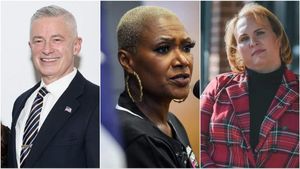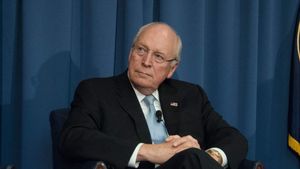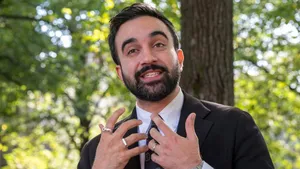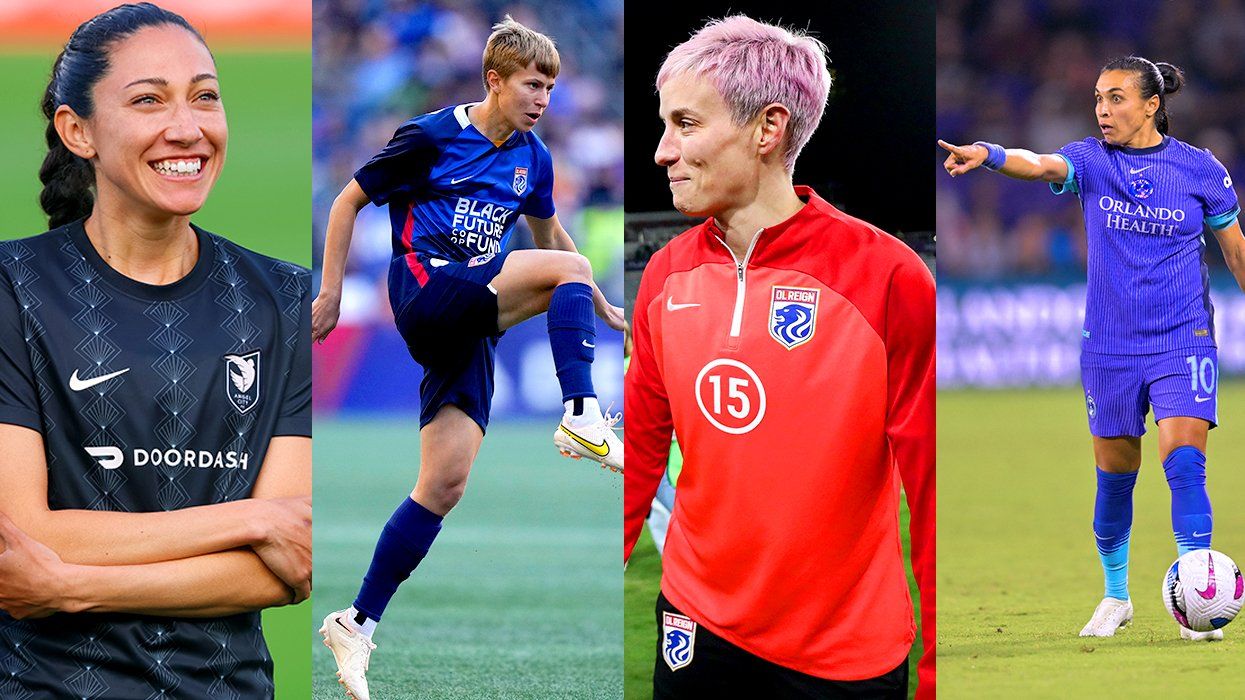CBS’s hit drama, The Good Wife, isn’t just good TV, it’s great TV. Airing on Sunday nights–one of the two best prime time slots on TV (Thursday is the other ratings juggernaut)–The Good Wife began its fifth season last month. It’s been non-stop action ever since.
The Good Wife is a show about women–how they live and work and have sex in a world that is, even as Fourth Wave feminism comes into play, run and owned by men. It’s a drama that states as a given that women are their own people–that they have sexual and emotional lives that may engage with men, but which belong to them. The Good Wife has always put women’s issues (abortion, rape, sexual harassment, children, pay inequity) on the front burner and accepted as a given that LGBT people are part of everyone’s family and in every workplace.
USA Today has called The Good Wife “broadcast’s best drama” and The Atlantic, whose critics seem to feel network is “over” and cable and Netflix series are the new and only worthwhile TV, has deemed it worthy of cable, noting the show is “delivering the best drama on network television.” Time calls The Good Wife “the best thing on TV outside cable.”
All true.
There is no better drama on all of TV about women and how they access power than The Good Wife. A show that is part-serial arc, part legal-procedural, the show’s focus is lead character, Alicia Florrick, a wife, mother and attorney. Alicia, played with awe-inspiring passion and nuance by Emmy-winner Julianna Margulies, is he wife of Peter Florrick (played with Mr. Big bluster and Machiavellian verve by Chris Noth, in a recurring role), the former Chicago Cook County states’ attorney.
When the show debuted in Sept. 2009, Alicia was left reeling from her husband’s involvement in a corruption scandal of Chicago proportions, one that involved money, power and of course, sex.
On the surface, the show looked, when it debuted, a little soap opera-y--like it would be a hand-wringing paean to wives who’d been wronged by yet stood by the politician husbands who had humiliated them. Alicia seemed a lot like Silda Spitzer, wife of New York’s Eliot Spitzer, who like Peter Florrick, had been caught in a myriad of prostitution dramas, with a little Elizabeth Edwards and Hillary Clinton circa 1996 folded in.
But that was the surface, and The Good Wife is anything but surface. The show’s title–once cloyingly objectifying–is actually highly ironic: Alicia is indeed a good wife, but she is so much more that she’s inverted that moniker completely.
It’s the “more” that Alicia is that makes the show mesmerizingly good. While Claire Danes is over on Showtime’s Homeland in the same time slot and Emily VanCamp and Madeleine Stowe battle it out on ABC’s Revenge, also in that same time slot, Margulies manages a level of subtlety with Alicia that none of those other ace actresses is able to employ, because one of the powers of The Good Wife is writing that is sheer perfection. Not since The West Wing and The Wire (some critics have referred to the show as The Wire Lite) has TV brought so much fraught politics–including sexual politics–to a TV hour.
Alicia started out stunned. She hadn’t known her husband was cheating with prostitutes, and the Internet being what the Internet is, videos began appearing. It didn’t matter if they were real or fake, the impact was the same. Peter was convicted and in prison, serving a short sentence, but a sentence nonetheless. Without money and with few resources, Alicia was forced to move herself and her two children, the teenaged Zach and the pubescent Grace, out of their Highland Park mansion and into an apartment in a neighborhood that made both her children angry. Her close friends of over a decade deserted her, not wanting to be tainted by the scandal. Her intrusive mother-in-law, Jackie (played with extraordinary aplomb by Tony-winning actress Mary Beth Peil), is a constant, manipulative thorn in her side, but Alicia needs her to help with Zach and Grace, because Alicia is forced to go back to work.
The perils of single motherhood.
And that’s where the drama unfolds. Alicia is hired as an law associate after 13 years of not practicing at Lockhart/Gardner. A former law school classmate, Will Gardner (Josh Charles),with whom Alicia may or may not have had an affair, convinces his partner, Diane Lockhart (Christine Baranski), that Alicia will be a perfect member of their team. Alicia’s prime competition is Cary Agos (Matt Czuchry), a grasping up-and-comer with ambition of a sort not seen since Marc Antony.
Other wild cards in this percolating drama are the bisexual investigator Kalinda Sharma (Archie Panjabi), Alicia’s damaged and damaging mother, Veronica Loy (Tony and Emmy winner Stockard Channing) and Alicia’s closeted gay brother Owen (Dallas Roberts, also on The Walking Dead). Martha Plimpton as Patti Nyholm, Mamie Gummer as Nancy Crozier and Carrie Preston as Elsbeth Tascioni appear in recurring roles as ace litigants. Anika Noni Rose is magnificent as Wendy Scott-Carr, one of Peter’s nemeses. The fabulous gay actor Alan Cumming, has a recurring role as Eli Gold, Peter’s campaign manager. Michael J. Fox recurred for several seasons as a disabled attorney, Lewis Canning and Tony-winner Nathan Lane continues to recur as Clarke Hayden. Both Matthew Perry and Dylan Baker played against type as villains.
The Good Wife is about a myriad of things, but most of all it’s about women navigating patriarchal systems. If that sounds oh-so-post-modern, it is–a bit. But since Second Wave feminism took hold, women have been told they can have it all. The question has always been–at what price?
Alicia is a wonderful mother. We see her caring and protective, fun and authoritarian. She has to constantly fight the influence of Jackie Florrick in the first few seasons until she finally has a stand-down with her. Then she has to find a way to allow her children back in their father’s life without compromising either herself or them.
Alicia is also a strong attorney, working hard yet finding her way and remembering early on what she first loved about the law. She’s ethical–much more so than either Will or Diane–but she also fights for her clients, even when she knows they may in fact be guilty.
But a major pivot of Alicia as a character is her role as sexual agent. She is a wife to the disgraced Peter and her love for him, albeit broken, makes everything in her life more difficult. To say she’s estranged from him is an understatement. But the sexual pull between them remains as does the link through their children. She’s drawn to his power as well as his power over her, but she’s determined not to be fooled by his charisma again.
And then there’s Will. An undercurrent of sexual tension evolves between the two over the course of the first season and eventually they become–briefly–lovers. As Alicia continues to be torn between Will and Peter, on the periphery stands Kalinda, obviously in love with Alicia (as I see it) but settling for being “besties” while hoping one day to convince Alicia that she is much better than any of these men.
The sexual tension between Kalinda and Alicia is there, we see it, it’s almost palpable, yet Alicia seems somehow oblivious to it–or chooses to be. When Kalinda’s abusive criminal ex-husband returns, it draws the two of them closer together, but Kalinda’s experience is the what-can-go-wrong scenario of women engaging with powerful and dangerous men. Kalinda is the dark side of Alicia–what happens when a woman’s sexuality seems to be all she has as a weapon. Kalinda uses her sexuality to manipulate everyone. We see her use it against an FBI agent who is in love with her and it reveals both her dysfunctional side as well as that manipulative element of some lesbian relationships.
In season four, Margulies’ former ER castmate Maura Tierney has a story arc as Maddy Hayward, a politician who may or may not have the hots for Alicia, but who definitely wants to manipulate their budding friendship and run against Peter for States Attorney.
The Good Wife has always put women front and center. Men are the foils against which women’s agency pivots. The show continually raises the same questions: Can women have power? Can women have it all? Can women ever be viewed as something other than sexual playthings? Can women be smart and achieving and still be sexual?
In season four, Jackie takes a lover after she has a small stroke. He’s younger, he’s sexy, he’s foreign. It’s difficult for Peter to watch, but Alicia says, “Good for her.”
In seasons three and four, Diane also takes a lover, who she married in the Oct. 27 episode. He’s the antithesis of her politically–a Sarah Palin aficionado, a Second Amendment Libertarian whom she met when he was an expert witness for a case. Yet he’s the only man she’s met who isn’t threatened by her progressive politics or her power.
Alicia’s relationships with Peter and Will, her antagonistic relationships with Eli and, initially, Cary, are all emblematic of what women have to deal with in daily life at work, at home, in the bedroom. How The Good Wife portrays these conflicts and how women still must do better than men, achieving more to be thought still only almost as good as their male peers, is one of the show’s many strengths.
How women are pitted against each other in the workplace as well as how difficult it is for women to have friendships that supercede their relationships with men is illumined week after week.
In the Oct. 27 episode, where Alicia strikes out on her own, we see the culmination of several seasons of building this character’s intentionality, confidence and strength. She is her own woman, able to take on all the people who have tried to limit her and manipulate her and silence her. Alicia the fighter, who believes she can indeed have it all, has been born. This is must-see TV for every woman or anyone who wants to understand women.
The Good Wife has won more than a dozen Emmys, between the show, the principles and guest stars. It is extraordinary TV. Watch it.
Victoria A. Brownworth is an award-winning journalist, editor and writer. She has won the NLGJA and the Society of Professional Journalists awards, as well as the Lambda Literary Award and has been nominated for the Pulitzer Prize. Her work has appeared in the New York Times, Baltimore Sun, Philadelphia Inquirer andThe Nation, among others. She writes weekly on LGBT TV in her column The Lavender Tube that originates out of San Francisco’s Bay Area Reporter. She is a regular contributor to The Advocate and SheWired, a blogger for Huffington Post and an contributing editor for Curve magazine and Lambda Literary Review. Her most recent book is From Where We Sit: Black Writers Write Black Youth, winner of the Moonbeam Award for Cultural/Historical Fiction 2012. Her novella, Ordinary Mayhem, won Honorable Mention in Best Horror 2012. @VABVOX























































































 Cindy Ord/Getty Images
Cindy Ord/Getty Images

























